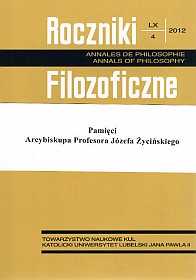Metodologiczna charakterystyka relacji między teorią i doświadczeniem
Abstrakt
The paper is divided in several parts, entitled as follows: introduction; the standard view, its char-acteristic; constructive challenge of the received standpoint; attempted resolutions of the problem of comparability; how do work visual perceptions in scientific observations? meaning variance of scien-tific terms; an attempt to construe the ground for comparability – concluding remarks.
Bibliografia
Achinstein P., On the Meaning of Scientific Terms. Journal of Philosophy 61(1964),
Achinstein P., Concepts of Science, Baltimore 1968,
Bohnen A., On the Critique of Modern Empiricism, Ratio 11, 1969
Carnap R., Philosophical Foundations of Physics. New York 1966, M. Gardner (red.),
Cornman J.W.,Materialism and Sensations, London 1971,
Feigl H. The ‘Orthodox’ View of Theories. Remarks In Defense as well as Critique. w: M. Rudner, S. Winokur (red.), Minnesota Studies in the Philosophy of Science Minneapolis 1970, vol. IV
Feyerabend P.K., Explanation, Reduction and Empiricism. w: H. Feigl, G. Maxwell (red) Minnesota Studies in the Philosophy of Science. Minneapolis 1962, vol.III,
Feyerabend P.K., Problems of Empiricism. w: R.G. Colodny (red.) Beyond the Edge of Certainty Pittsburgh 1965
Feyerabend P.K., Reply to Criticism: Comments on Smart, Sellars and Putnam. w: R. Cohen, M. Wartofsky (red), Boston Studies in the Philosophy of Science, New York 1965, vol. II,
Feyerabend P.K., Against Method: Outline of an Anarchistic Theory of Knowledge.w: M. Rudner, St. Winokur (red) Minnnesota Studies in the Philosophy of Science , Minneapolis 1970, vol.IV,
Fine A., Consistency, Derivability, and Scientific Change. Journal of Philosophy 64 (1967)
Fine A., How to Compare Theories: Reference and Change. Nous 9 (1975)
Gibson J.J., The Perception of the Visual World, Boston 1950
Gibson J.J., The Senses Considered as Perceptual Systems, Boston 1966
Haber R.N., Hershenson M., The Psychology of Visual Perception, New York 1973 .
Hajduk Z., Rekonstrukcja i ocena teorii empirycznych w uhistorycznionej filozofii nauki. Roczniki Filozoficzne 27(1979)3
Hajduk Z., Struktura i ocena teorii empirycznych w neopopperowskiej filozofii nauki, w: K. Kłósak, M. Lubań-ski, Sz. W. Ślaga (red.), Z zagadnień filozofii przyrodoznawstwa i filozofii przyrody, Warszawa 1982, IV,
Hajduk Z., Temporalność nauki. Kontrowersyjne zagadnienia dynamiki nauki., Lublin 1995,
Hajduk Z., Metodologia nauk przyrodniczych, Lublin 2002,
Hajduk Z.,Nauka a wartości: Aksjologia nauki - Aksjologia epistemiczna, Lublin 2008,
Hanson N.R., : Patterns of Discovery: An Inquiry into the Conceptual Foundations of Science, Cambridge 1958,
Hanson N.R., , Perception and Discovery: An Introduction to Scientific Inquiry. San Francisco 1969,
Heller M., Filozofia nauki. Wprowadzenie, Kraków 2009
Hempel C.G., On the ‘Standard’ Conception of Scientific Theories. w: M. Rudner, S. Winokur (red.), Minnesota Studies in the Philosophy of Science Minneapolis 1970, vol. IV
Jodkowski K., Filozofia nauki Paula K. Feyerabenda. Stadium umiarkowane. Studia Filozoficzne. 11(168) 1979,
Jordan P., Atom und Weltall. Einführung in den Gedankeninhalt der modernen Physik, Braunschweig 19602.
Klein G.S., Perception, Motives, and Personality, New York 1970
Kordig C., Feyerabend and Radical Meaning Variance, Nous 4, (1970),
Kordig C., The Justification of Scientific Change, New York 1971
Kuhn Th.S., The Copernican Revolution: Planetary Astronomy In the Development of Western Thought, New York 1959
Kuhn Th.S.,, Struktura rewolucji naukowych, Warszawa 1968
Machamer P., Recent Work on Perception. American Philosophical Quarterly 7(1970),
Neurath O., Protocol Sentences w: A.J. Ayer (red.),Logical Positivism, , New York 1959,
Nugayev R.M .,A Simple Theory-Change Model, Epistemologia 21(1998)2
Oppenheimer R., Science and Common Understanding, New York 1954
Polikarov A., On Various Kinds of Scientific Revolutions. Epistemolgia XVI, 1993,
Popper K.R., The Logic of Scientific Discovery, London 1959,
Putnam H., How not to Talk about Meaning, w: R. Cohen, M. Wartofsky, (red), Boston Studies in the Philoso-phy of Science. New York 1965, II,
Ramsey F., The Foundations of Mathematics, Littlefield 1960,
Rosen G., Formulations of Classical and Quantum Dynamical Theory, New York 1969,
Scheffler I., The Anatomy of Inquiry : Philosophical Studies in the Theory of Science, New York 1963;
Scheffler., Science and Subjectivity, Indianopolis 1967
Schlick M., The Foundations of Knowledge. w: A.J. Ayer (red.),Logical Positivism, New York 1959,
Shapere D., Meaning and Scientific Change, w: R. Colodny, (red). Beyond the Edge of Certainty, Pittsburgh 1965, II,
Slater J., Concepts and Development of Quantum Physics, New York 1969,
Taylor E.F., Wheeler J.A., Spacetime Physics. San Francisco 1966
Townsend B., The Comparability of Scientific Theories, Univ. of Havaii 1976; nieopublikowana praca doktorska,
Tuomela R., Theoretical Concepts, Wien 1973,
Wszołek S., Teoria i doświadczenie w nauce i teologii.w: Przestrzenie księdza Cogito, Tarnów 1966.
Życiński J., Elementy filozofii nauki. Tarnów 1966
Copyright (c) 2012 Roczniki Filozoficzne

Utwór dostępny jest na licencji Creative Commons Uznanie autorstwa – Użycie niekomercyjne – Bez utworów zależnych 4.0 Międzynarodowe.





